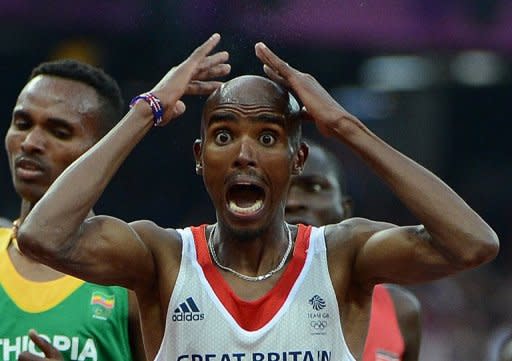Six moments that defined the London Olympic Games
From Michael Phelps's golden farewell to the exploits of Usain Bolt: AFP looks back at six moments which defined the 2012 London Olympics: MICHAEL PHELPS WINS THE 200M MEDLEY Michael Phelps, the hero of Beijing after winning eight golds, had already passed gymnast Larisa Latynina's record of 18 Olympic medals to become the most decorated Olympic athlete in history. However his shock fingertip loss in the 200m butterfly -- an event he had ruled for more than a decade -- raised the prospect of the greatest swimmer the sport has seen leaving London without winning gold in an individual event. But doubts about Phelps's form were erased as he delivered a vintage performance in the 200m medley to become the first man to win the same individual swimming event in three straight Games. The victory acted as a catalyst for the remainder of the Olympics, Phelps adding a second individual gold in the 100m butterfly before signing off with his fourth gold of the Games in the 4x200m medley relay. JESSICA ENNIS GIVES HOSTS A 'FREEMAN MOMENT' When Sebastian Coe presented Jessica Ennis with a silver medal at the World Championships in 2011, the London Games chief quietly informed the British heptathlete that he was looking forward to draping a gold medal around her neck at the Olympics a year later. In the years leading up to London, the 26-year-old golden girl of British track and field had become the public face of the host nation's hopes, her image adorning thousands of billboards across the country. The level of exposure inevitably led to questions about whether Ennis would be able to cope with the pressure. But from the moment she set a blistering personal best in the opening event of the hepathlon, the 100m hurdles, her coronation was never in doubt. By the time the final event rolled around, her lead was unassailable. She produced a rousing finish to win her 800m and give the home crowd a moment to savour comparable to Cathy Freeman's 400m victory in Sydney 12 years ago. USAIN BOLT SPRINTS INTO HISTORY On the eve of the Olympics, a veil of intrigue had been draped across Usain Bolt's preparations for the defence of his 100m and 200m titles. Ever since the Jamaican's disqualification at the 2011 World Championships, the aura of invincibility surrounding the star of the Beijing Olympics had been steadily chipped away. Defeats to training partner Yohan Blake in both the 100m and 200m events at the Jamaican Olympic trials only heightened the sense that Bolt's crown may be slipping. By the time he arrived in London, even Hollywood hellraiser Mickey Rourke was claiming to have beaten Bolt in a drunken dash outside a nightclub. It took precisely 9.63 seconds for the questions to be erased, as Bolt coasted to victory in the 100m, clocking the second fastest time in history. Four days later, Bolt ensured his place in the pantheon with a similarly emphatic win in the 200m, becoming the first man to win back-to-back 100m and 200m titles. "I'm a living legend," Bolt declared afterwards. Few would disagree. SAUDI JUDOKA LEADS WOMEN INTO NEW ERA Her much-anticipated participation in Olympic competition only lasted 82 seconds, but Wojdan Shaherkani's first round exit in the under-78kg judo competition was emblematic of the "Women's Games." For the first time in history, every competing nation had a woman athlete in their delegation, with Saudia Arabia, Qatar and Brunei among those countries consigning exclusively-male teams of the past to history. The 17-year-old Shaherkani's Olympics may have been all too fleeting, but the mere fact of her presence in London may echo for generations. "I think that because of my participation in this Olympic Games, other Saudi women will participate in other competitions in the future," she said. Afghan's only female athlete, the 100m runner Tahmina Kohistani, ran her heat wearing a hijab and covered. When asked why she had shed a tear after her elimination, Kohistani spoke movingly: "It is the journey. Being here is more important for me than a gold medal." LIU XIANG BROKEN BUT NOT BEATEN Four years after the crushing disappointment of Beijing, where he sent millions of fans into mourning following his withdrawal just moments before the heats of the 110m hurdles, London offered Liu Xiang the chance of redemption. The first Chinese man to win an Olympic gold medal in athletics, Liu had arrived in London dreaming of emulating his 2004 triumph in Athens as he sought to exorcise his Beijing nightmare. But a snapped Achilles tendon as he leapt to meet the first hurdle of his opening heat left his London campaign, and his career in tatters. Yet Liu was determined to leave the Olympics on his own terms. Instead of retiring to seek medical attention, the hurdler hopped up the track on one leg, kissing the final hurdle before being greeted by his fellow competitors. Like US sprinter Manteo Mitchell -- who suffered a broken leg during his 4x400m relay but somehow managed to keep running -- it was one of many examples of the Olympic spirit thriving in London. MO FARAH -- THE MAGNIFICENT SEVENTH By entering both the 10,000m and 5,000m, Mo Farah was attempting to join the elite band of six long-distance runners who have pulled off the double at an Olympics. The first half of his improbable double was duly achieved on the opening weekend when he produced a tactical masterclass to sprint home to glory on a night when Britain won three gold medals in the Olympic Stadium. The Somalian-born star returned to the track for the 5,000m heats in midweek and wondered aloud if he had the energy for a tilt at the second gold. Yet Farah's concern was misplaced as he turned in another masterful display, conjuring up a devastating final lap and holding off the chasing pack to become only the seventh man to do the double.






